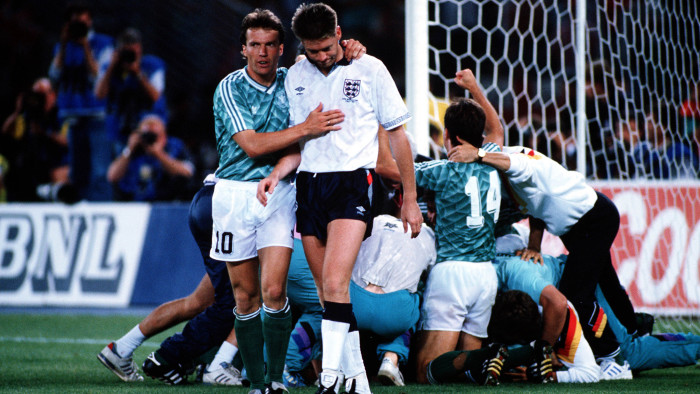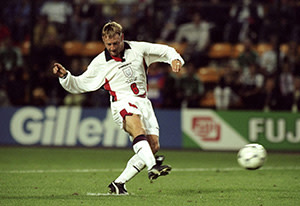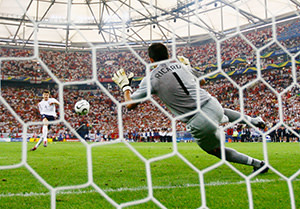England: why are they so bad at penalties?

Roula Khalaf, Editor of the FT, selects her favourite stories in this weekly newsletter.
It’s early on a Monday morning in spring at the Oceanico Victoria course in Portugal’s Algarve. This is the time of year when serious northern golfers, after months of playing in the cold, flock south to play two rounds a day. The clubhouse is full of Irish, Swedish and German chatter; the sun-dappled putting green is a kaleidoscope of fashion disasters. On the driving-range, one man’s outfit stands out: white shoes, lime-green trousers and navy T-shirt with lime trimming. You have to be a very decent golfer to get away with those clothes; that, or a Portuguese footballer with a place in history.
Ricardo Alexandre Martins Soares Pereira is both. After playing golf for five years, he already has a handicap of four. He said the game made him a better goalkeeper: it improved his concentration, and taught him to refocus quickly after a mistake. Ricardo, as he is known, is the man who has contributed most to England having the worst record in penalty shoot-outs of any country in international football. As Portugal’s goalkeeper in the 2004 European Championship quarter-final, he ripped off his gloves before saving Darius Vassell’s strike, and then converted the winning kick himself. Two years later, in the 2006 World Cup quarter-final, he saved three England penalties, the most by any keeper against any team in a World Cup shoot-out.
WORLD CUP SPECIAL

Italy
Exclusive interview with top player Andrea Pirlo
Spain
How the reigning champions plan to do it again
Argentina
Can Messi ‘the Messiah’ live up to his name?
Cameroon
The team with ‘hemle’ and Samuel Eto’o on their side
Brazil
One man, a country’s hopes: superstar Neymar
Bosnia & Herzegovina
Their manager talks strategy for their debut World Cup
United States
How the US learnt to
love soccer
Colombia
Can the team affect presidential elections?
My friend Pelé
An ‘imperialist Yankee’ reminisces
How to save a penalty
Dutch goalkeeper
Michel Vorm explains
England travels to the World Cup in Brazil in fear of the penalty shoot-out. The team has lost six out of seven shoot-outs in major tournaments. Going into this competition, all conversations about England’s chances end with the rider: “But what if it goes to penalties?” As part of my research into penalty kicks for my book, Twelve Yards: The Art and Psychology of the Perfect Penalty, I spoke to a player from every team to have beaten England on penalties. I visited Ricardo to see if he could help the country I support get over the penalty demons that he partly created.
As we sat overlooking the putting green, I showed Ricardo a video of the 2006 shoot-out on my phone. Reliving it with him was like watching a movie with the lead actor sitting next to you. He drew me to moments that I had thought insignificant, whereas elements that seemed important to me had barely registered with him.
Simao Sabrosa scored first for Portugal, and Frank Lampard was up for England. “I said to the guys before we started, ‘If I save their first kick, we’ve won,’” Ricardo told me.“Because I knew if they see Lampard miss a penalty, they will never recover.” Lampard shot to his natural side – to the right of the goalkeeper – and Ricardo dived to punch it away. The TV cameras focused on the England players, and Steven Gerrard can be seen looking up to the heavens, almost in tears. Ricardo noticed too: “When I saved it, I saw [Rio] Ferdinand and Gerrard and they just went, ‘Pffffff … ’ Their heads went down, and I knew we had the advantage. I saw them deflate. ‘The best guy they have has missed. Pssshhh, what chance have we got now?’”

By the time Jamie Carragher stepped up to take England’s fourth kick, Portugal were 2-1 up and Ricardo had also saved Gerrard’s penalty. Carragher had come on two minutes before the end of extra time, specifically, it seemed, to take a penalty. This decision seems to have been based on an error. England’s assistant manager Tord Grip explained afterwards: “He took one really well for Liverpool in the Champions League final.” But Carragher has said that, despite having watched the DVD of the dramatic 2005 game against Milan “a thousand times”, he has never yet spotted himself taking a penalty.
Against Portugal, he spotted the ball, turned away from Ricardo and, without a break in motion, started his run-up. The referee Horacio Elizondo had not blown his whistle and, two steps before Carragher reached the ball, the Argentinian blew three times to signify the kick would not count. Carragher kept going, and struck an excellent penalty, which Ricardo watched go past him.
“Carragher turned away and, before I knew it, he was running towards me. But I knew the referee hadn’t blown so I just put my hands out and went, ‘Wait, wait’. The referee smiled at him and said, ‘Wait for my whistle.’ I looked at him after that and I thought, ‘You’re f***ed, I’m going to save this.’ This guy was screwed, his mind was f***ed up, he was too nervous.”

Would Carragher choose the same side again, or change his mind? “I felt he was going to change his mind,” said Ricardo. He was right: Carragher switched sides and the goalkeeper pushed the ball on to the crossbar. Cristiano Ronaldo scored next to win.
Afterwards Fifa awarded England’s midfielder Owen Hargreaves the Man of the Match award, as Ricardo put it, “Just because he was the only player able to score a penalty past me”. Elizondo signed the match ball and gave it to Ricardo, because he felt so bad about Fifa’s decision.
I asked Ricardo why England had lost, yet again. “These big players miss and that’s not because they are the wrong players to take penalties. It’s a mental thing. They need to do some mental work.”
So what can England do to avoid future penalty angst? Ricardo gave me three solutions: “I want to see England win – and I want to give them confidence,” he said.
1. Only focus on the positive
“This is an opportunity, not a problem. Lampard and Gerrard always score in the league. So how in big moments did they miss? It has to be mental. They must only prepare for good things, not for failure.”
2. Block out the media
“We do read the papers at these tournaments and every day you [the English press] are speaking about penalties, praying for no penalties. ‘We don’t want penalties, we don’t want penalties.’ If you have bad memories of it, just don’t talk about it. Get on with it.”
3. Forget about the history
“When they lost to us, you could see them thinking, ‘Oh, we lost again on penalties.’ It was almost like it was fate. These guys suffer too much. We felt with the England team that it was like their world was falling apart. It’s like a film going round in their head … and they know how it always ends.”
…
The answer to England’s problems may be found in Oslo, in an unprepossessing office next to Norway’s Olympiatoppen training centre. Here sits Geir Jordet, a former footballer who is director of psychology at the Norwegian Centre of Football Excellence. To understand their anxieties, Jordet interviewed 10 of the 14 players who took penalties for either Holland or Sweden in their Euro 2004 quarter-final shoot-out (which Holland won, its first and only shoot-out success; the Dutch rival England for incompetence from the spot). The results, published as an academic study, were fascinating.
For the purpose of his interviews, Jordet broke up the shoot-out into four phases:
Phase One: the break after extra-time
Phase Two: the centre circle
Phase Three: the walk
Phase Four: at the penalty mark.
He then assessed each player’s reaction at each phase. Six interviewees knew before Phase One that they would be taking a penalty; two specifically did not want to take one and another was annoyed that three other teammates had, during Phase One, expressly ruled themselves out. Four players felt more stressed when they were told what number they would be shooting, as they didn’t know – and therefore couldn’t prepare for – what the shoot-out situation would then be; another four were calm because they knew when they would be shooting.
Surprisingly, it was Phase Two that was the most stressful, particularly for the players on the losing side (Sweden), who were not standing in the centre circle as a group. “We hardly talked during the shoot-out,” one player said. “Nothing. I didn’t say anything and nobody said anything to me.” Only three players used the centre circle phase to focus on their own penalty; for the others, the tension grew as they waited to shoot.
For three players, the loneliness of the walk, Phase Three, was the toughest part of the process. By Phase Four, when the players were at the ball itself, only two were expressing anxiety. Jordet concluded that coaches could learn something about every phase of the shoot-out. From Phase One: that players like to know the order they will be kicking as early as possible – and don’t like surprises (or teammates bailing on them). From Phase Two: that waiting alone for your turn throws up negative emotions. From Phase Three: that the solitude of the walk calls for a coping mechanism. And from Phase Four: how best to face the goalkeeper in a psychological confrontation.
When I asked Jordet why England lose so often on penalties, he came up with several explanations. He’d looked at whether you should shoot high or low, strike with power or go for accuracy, and found no significant effects. “The big effects were all about pressure and how you deal with stress. It was not about football but psychology.”
One psychological factor was, as Ricardo suggested, the weight of history. Jordet studied the effect that losing one or two preceding shoot-outs had on the next one, despite often being taken years later. It turned out that the worse a country’s record, the more likely it is to lose the next shoot-out:
● Likelihood to score a penalty if team lost last two shoot-outs: 57 per cent.
● Likelihood to score a penalty if team lost last shoot-out: 72 per cent.
● Likelihood to score a penalty if team is in first shoot-out: 76 per cent.
● Likelihood to score a penalty if team won last shoot-out: 83 per cent.
● Likelihood to score a penalty if team won last two shoot-outs: 89 per cent.
A player’s likelihood of converting a penalty for a team whose last two shoot-outs ended in defeat drops considerably, to 57 per cent – even if that player was not part of the team at the time of those defeats. A national history of winning shoot-outs creates a virtuous circle. The cycle of defeat, though, is a vicious one.
This backs up studies in social psychology that reveal that the negative effects of bad things affect us much more dramatically than positive effects of good things. Penalties distil this effect even further: rather than one team doing well, the other team doing badly is what decides most shoot-outs.
Jordet had other findings: that England players react quicker than any other nation to the referee’s whistle to signify the penalty can be taken; that considerably more England players turn their backs on the goalkeepers while walking to their mark after spotting the ball (gaze avoidance, a sign of stress); and that goalkeepers facing English penalties dive the right way 58 per cent of the time (only Holland’s penalties are easier to read, 63 per cent).
I asked Jordet what he felt his most significant discovery was. He said it was the link between those players who celebrated scoring penalties in a shoot-out and their teams going on to win. The emotional contagion of success is a powerful force and body language in the shoot-out becomes a significant factor. He showed me a video of Swedish player Christian Wilhelmsson trudging back to the centre circle with his head down after scoring, compared with Roy Makaay, Holland’s next kicker, wheeling away in delight. Sweden missed their next kick, and it remains Holland’s only shoot-out success.
The team kicking first in a shoot-out also has a 60-40 chance of winning, which means the toss to decide who kicks first carries with it a significant additional importance.
Look out for these factors in Brazil: if you see England players kicking second, turning their backs on the goalkeeper, rushing after the referee blows his whistle and not celebrating a scored penalty, then it’s time to fear the worst.
——————————————-
This is an edited extract from ‘Twelve Yards: The Art and Psychology of the Perfect Penalty’ by Ben Lyttleton, published by Bantam Press
See Holland goalkeeper Michel Vorm gives a penalty-taking masterclass
To comment on this article please post below, or email magazineletters@ft.com
Comments